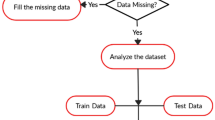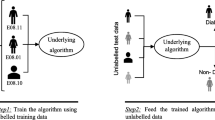Abstract
Heart disease is the major cause of mortality in the world. The heart disease prediction from the clinical data is deliberate as the most important subject in clinical data analysis. Especially the size of data in health care is vast. Data mining (DM) assists decision and prediction from the raw health care data. DM converts the large collection into useful information. Several existing studies utilize the data mining approaches in heart disease prediction. There is only little research focused on selecting the important features which play a significant role in predicting heart disease is less. The aim of this study is to provide an enhanced approach with novel feature selection and classification technique to predict mortality in congestive heart failure patients. Through this approach the death rate due to heart disease will be decreased gradually. The ant colony optimization (ACO) algorithm is utilized for selecting the best feature for hybrid K-nearest neighbor (KNN) classifier. The proposed approach is compared with the prior classification techniques such as the Support vector machine, Naïve Bayes, KNN, C4.5, and decision tree. UCI Cleveland dataset is utilized for our implementation. Using the Netbeans IDE an experimental was conducted and the result shows that the heart disease prediction model provides a better result with accuracy of 99.2%.The present study shows the efficiency of the HKNN in heart disease prediction system. Initially important features are analyzed and then classification is utilized to obtain a better result.






Similar content being viewed by others
Change history
23 June 2022
This article has been retracted. Please see the Retraction Notice for more detail: https://doi.org/10.1007/s12652-022-04220-1
References
Dewan A, Sharma M (2015) Prediction of heart disease using a hybrid technique in data mining classification. In: 2015 2nd international conference on computing for sustainable global development (INDIACom). IEEE, pp 704–706
Dorigo M (2007) Ant colony optimization. Scholarpedia 2(3):1461
Hajar R (2017) Risk factors for coronary artery disease: historical perspectives. Heart Views 18(3):109
Haq AU, Jian PL, Muhammad HM, Shah N, Ruinan S (2018) A hybrid intelligent system framework for the prediction of heart disease using machine learning algorithms. Mobile Inf Syst
Imandoust SB, Mohammad B (2013) Application of k-nearest neighbor (knn) approach for predicting economic events: theoretical background. Int J Eng Res Appl 3(5):605–610
Kavitha R, Kannan E (2016) An efficient framework for heart disease classification using feature extraction and feature selection technique in data mining. In: 2016 International conference on emerging trends in engineering, technology and science (ICETETS). IEEE, pp 1–5
Khemphila A, Veera B (2011) Heart disease classification using neural network and feature selection. In: 21st international conference on systems engineering. IEEE, pp 406–409
Lai H-J, Tan-Hsu T, Chih-Sheng L, Yung-Fu C, Hsuan-Hung L(2020) Designing a clinical decision support system to predict readmissions for patients admitted with all-cause conditions. J Ambient Intell Humaniz Comput 1–10
Latha C, Beulah C, Carolin Jeeva S (2019) Improving the accuracy of prediction of heart disease risk based on ensemble classification techniques. Inform Med Unlocked 16:100203
Makhlouf A, Isma B, Nadia S, Amar RC (2019) Ambient assistance service for fall and heart problem detection. J Ambient Intell Humaniz Comput 10(4):1527–2154
Mohan S, Chandrasegar T, Gautam S (2019) Effective heart disease prediction using hybrid machine learning techniques. IEEE Access 7:81542–81554
Pawlovsky AP (2018) An ensemble based on distances for a kNN method for heart disease diagnosis. In: 2018 International conference on electronics, information, and communication (ICEIC). IEEE, pp 1–4
Saleh AI, Shehata SA, Labeeb LM (2019) A fuzzy-based classification strategy (FBCS) based on brain–computer interface. Soft Comput 23(7):2343–2367
Sowmiya C, Sumitra P (2017) Analytical study of heart disease diagnosis using classification techniques. In: 2017 IEEE international conference on intelligent techniques in control, optimization and signal processing (INCOS). IEEE, pp 1–5
Srinivas K, Kavihta Rani B, Govrdhan A (2010) Applications of data mining techniques in healthcare and prediction of heart attacks. Int J Comput Sci Eng (IJCSE) 2(2):250–255
Subbulakshmi CV, Deepa SN (2015) Medical dataset classification: a machine learning paradigm integrating particle swarm optimization with extreme learning machine classifier. Sci World J
Uyar K, Ahmet İ (2017) Diagnosis of heart disease using genetic algorithm based trained recurrent fuzzy neural networks. Proc Comput Sci 120:588–593
Vijayashree J, Parveen Sultana H (2018) A machine learning framework for feature selection in heart disease classification using improved particle swarm optimization with support vector machine classifier. Programm Comput Softw 44(6):388–397
Yazid MA, Haikal S, Shukor T, Novi A (2018) Artificial neural network parameter tuning framework for heart disease classification. Proc Electric Eng Comput Sci Inform 5(5):674–679
Author information
Authors and Affiliations
Corresponding author
Ethics declarations
Conflict of interest
The authors declare that they have no conflict of interest.
Ethical approval
All procedures performed in studies involving human participants were in accordance with the ethical standards of the institutional and national research committee and with the 1964 Helsinki declaration and its later amendments or comparable ethical standards.
Informed consent
Informed consent was obtained from all individual participants included in the study.
Additional information
Publisher's Note
Springer Nature remains neutral with regard to jurisdictional claims in published maps and institutional affiliations.
This article has been retracted. Please see the retraction notice for more detail: https://doi.org/10.1007/s12652-022-04220-1
About this article
Cite this article
Sowmiya, C., Sumitra, P. RETRACTED ARTICLE: A hybrid approach for mortality prediction for heart patients using ACO-HKNN. J Ambient Intell Human Comput 12, 5405–5412 (2021). https://doi.org/10.1007/s12652-020-02027-6
Received:
Accepted:
Published:
Issue Date:
DOI: https://doi.org/10.1007/s12652-020-02027-6




